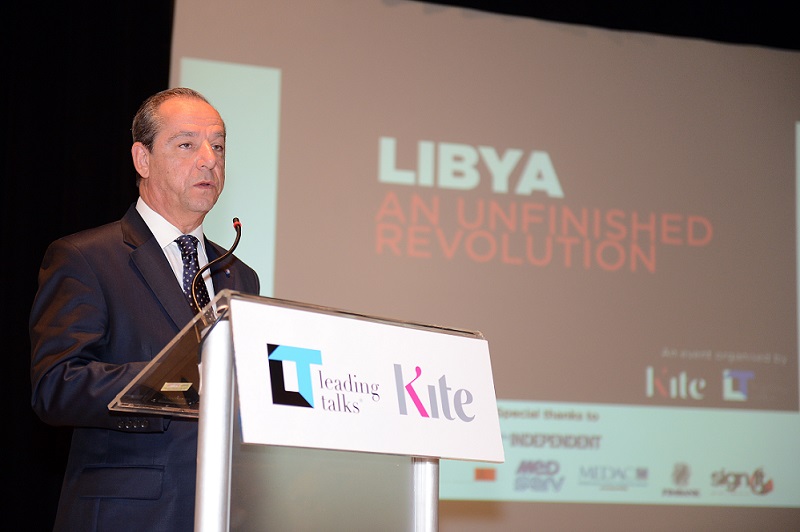![Lawrence Gonzi, former Maltese prime minister at the Libya event in Malta (Photo: . . .[restrict]Kite Group).](http://www.libyaherald.com/wp-content/uploads/2015/02/4-Libya-Unfinished-Revolution-270215-b-300x200.jpg)
By Libya Herald staff.
Malta, 27 February 2015:
Over 100 Maltese, Libyan and members of the international community in Malta interested in Libya attended the debate entitled ‘Libya an Unfinished Revolution’ held yesterday at the Old University Building in Valetta.
Two panels of speakers took part, including the American ambassador to Malta Gina Abercrombie-Winstanley, Deborah Jones, the US Ambassador to Libya, Maltese political figures and the journalist Mary Fitzgerald.
In the event chaired by Joseph Cassar, former Maltese Ambassador to Libya, the panellists shared their views on developments in Libya, prospects for the UN-brokered negotiations and Malta’s role in supporting Libya during the current crisis.
With the next round of UN talks in the balance, a key message from the event to all Libyan parties to the conflict was that they needed to participate in the UN-led peace talks, and come together to form a national unity government.
Given the suffering Libyans have already endured, the deteriorating security and economic situation, and the emergence of Islamic State in Libya, Malta and the international community are urging Libyans to reach a compromise, as Libya cannot afford to fail.
Speaking at the session, former Prime Minister of Malta, Lawrence Gonzi, reflected on Libya today, seeing the current situation as “a cause of grave concern to neighbouring states, including Malta, and beyond.” However, “greatest concern is for the welfare and well-being of the Libyan people.”
He urged that “the international community – and especially the European community – must continue to believe that Libya and the Libyan people can and are able to resolve their differences and to translate the dreams that inspired their 2011 uprising into reality.”
He also hoped that “all sides to this internal conflict realise that it is now time for them to seek what a united Libya needs in this hour of historic significance for the Libyan population and for us all.”
These sentiments were shared by Roberta Matsola, Malta’s Shadow Minister for European and Foreign Affairs, who confirmed that “Malta stood ready to help” and reiterated the need for Libyans to come together, saying as US Ambassador Deborah Jones had said, “When moderates do not unite, extremists will rule”.
Recognising the challenges facing Libya, Matsola also recommended that Malta plan to return to its role as a humanitarian hub as it did in the immediate aftermath of the overthrow of Qaddafi in case the conflict escalates forcing Libyans and others to flee Libya.
Her comments also highlighted the economic impact the crisis was already having on Maltese businesses with activities in Libya, who she observed “were moving from a temporary lull in activity to a practical shutdown of activities”.
Ian Borg, Maltese Parliamentary Secretary for the EU Presidency and EU Funds echoed the call for Libyans to come together, urging Libyans from all sides to have a shared sense of responsibility in striving for national unity. He also advised that Malta needed to prepare to support Libya as soon as needed in its post-conflict stage.
Helping to provide some background and a wider context for the current crisis, journalist Mary Fitzgerald shared her insights on key socio-political events in Libya since the 2011 revolution and the challenges facing Libya and the diverse interest groups in Libya’s political landscape.
With Islamic State exploiting the security vacuum in Libya, all sides in Libya are facing increasing international pressure to participate in the UN-led peace negotiations and agree the formation of a national unity government.
However, as Fitzgerald observed, this raises some difficult questions which need to be tackled – including who should be included in a national unity government. [/restrict]







